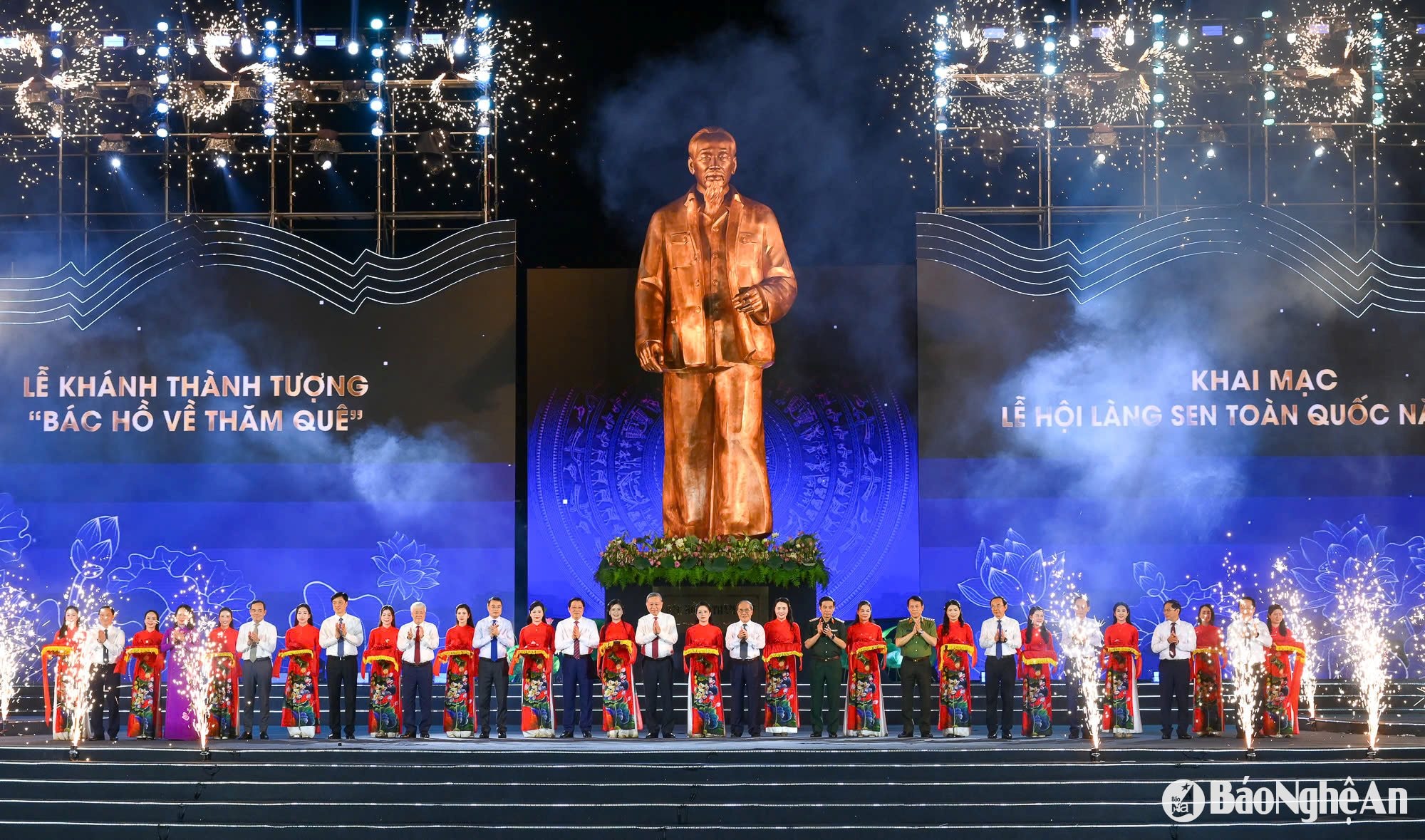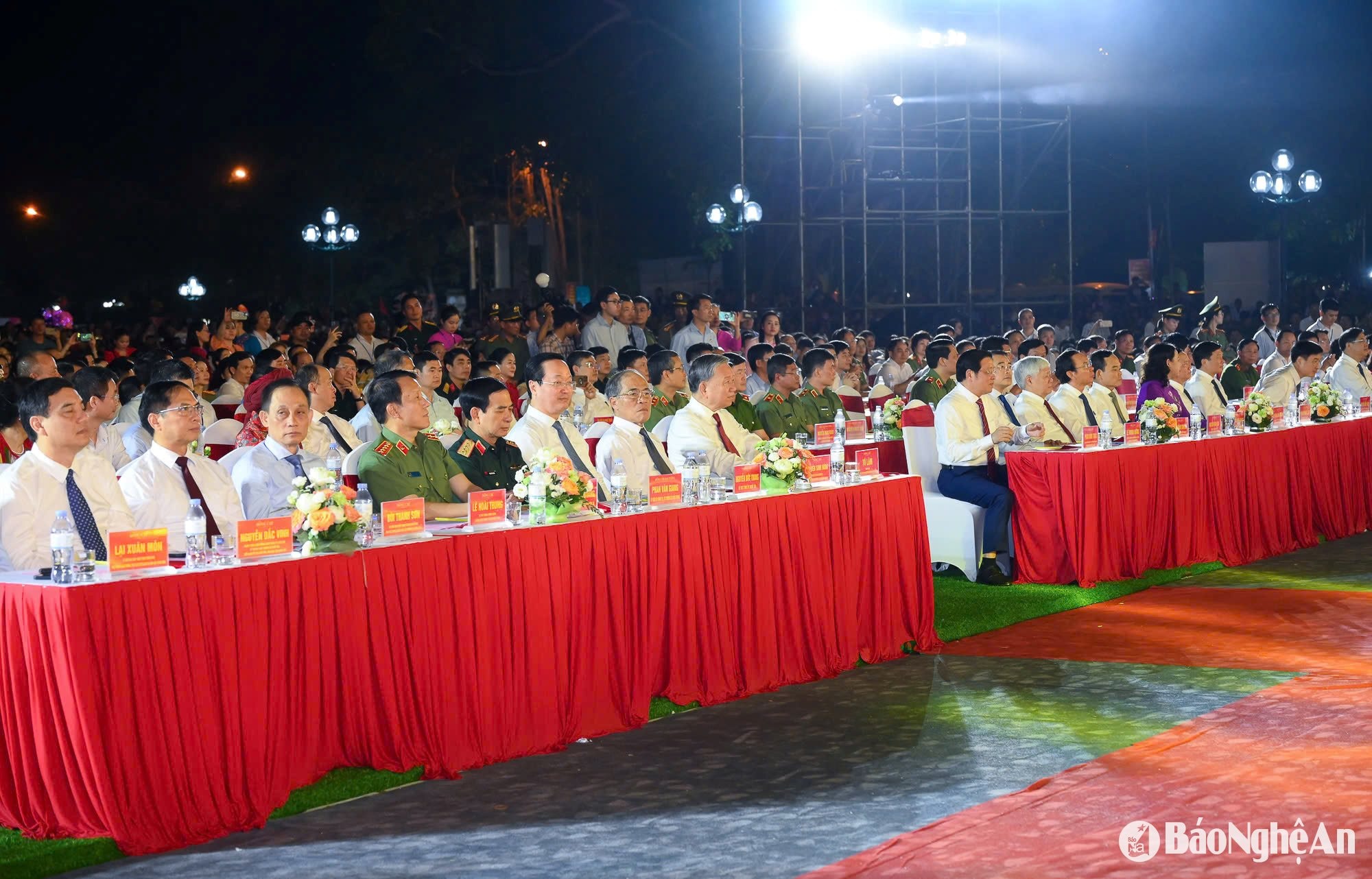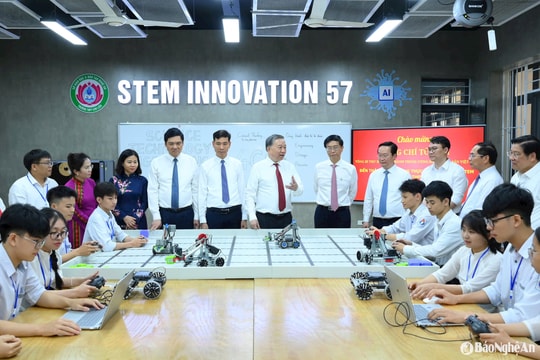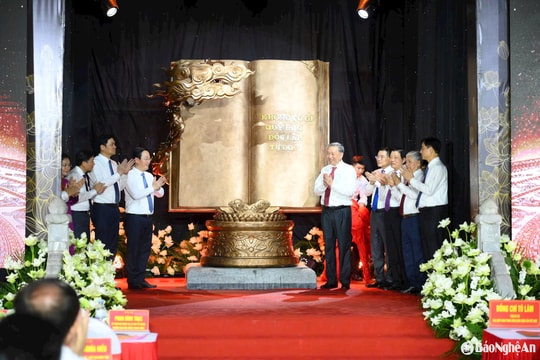Solemn inauguration ceremony of the statue 'Uncle Ho visits his hometown' in Kim Lien, Nam Dan, Nghe An
On the evening of May 15, in Kim Lien commune, Nam Dan district (Nghe An), General Secretary To Lam and other leaders and former leaders of the Party, State and Nghe An province cut the ribbon to inaugurate the statue "Uncle Ho visits his hometown".

That sacred moment became even more meaningful when the heroic melody of the brass piece “Six things Uncle Ho taught the People's Public Security”, performed by the brass orchestra of the People's Public Security Ceremonial Group, resounded, as a respectful tribute from the Public Security force to President Ho Chi Minh - the founder, leader and trainer of the Vietnam Public Security force.
The event took place within the framework of the 2025 Lotus Village Festival, which is organized nationwide. This is a key cultural activity to celebrate the 135th anniversary of President Ho Chi Minh's birthday (May 19, 1890 - May 19, 2025), an opportunity for the entire Party, people and army to review his life, career and passionate love for his homeland and country.

Attending the program were comrade Nguyen Sinh Hung - former member of the Politburo, former Chairman of the National Assembly; Politburo members: Le Minh Hung - Secretary of the Party Central Committee, Head of the Central Organization Committee; Phan Dinh Trac - Secretary of the Party Central Committee, Head of the Central Internal Affairs Committee; Nguyen Duy Ngoc - Secretary of the Party Central Committee, Chairman of the Central Inspection Committee; Do Van Chien - Secretary of the Party Central Committee, Chairman of the Central Committee of the Vietnam Fatherland Front; General Phan Van Giang - Minister of National Defense; General Luong Tam Quang - Minister of Public Security; Nguyen Van Nen - Secretary of the Ho Chi Minh City Party Committee.
Also attending were Party Central Committee Secretaries: Le Hoai Trung - Chief of the Party Central Committee Office; Tran Luu Quang - Head of the Central Committee for Policy and Strategy.
Comrades of the Party Central Committee: Vo Thi Anh Xuan - Vice President; Bui Thanh Son - Deputy Prime Minister, Minister of Foreign Affairs; Nguyen Khac Dinh - Permanent Vice Chairman of the National Assembly; Lai Xuan Mon - Permanent Deputy Head of the Central Propaganda and Education Commission; Nguyen Dac Vinh - Member of the National Assembly Standing Committee, Chairman of the National Assembly's Committee for Culture and Education; Pham Gia Tuc - Deputy Chief of the Party Central Committee Office; Le Quoc Minh - Deputy Head of the Central Propaganda and Education Commission, Editor-in-Chief of Nhan Dan Newspaper, President of the Vietnam Journalists Association; Nguyen Thi Tuyen - President of the Vietnam Women's Union; Senior Lieutenant General Tran Quoc To - Deputy Secretary of the Central Public Security Party Committee, Deputy Minister of Public Security.
Also attending were comrade Bui Quang Huy - Alternate member of the Party Central Committee, First Secretary of the Party Central Committee of the Ho Chi Minh Communist Youth Union and leaders of central departments, ministries, branches, the Party Central Committee Office, the President's Office, the National Assembly Office, the Government Office, and leaders of Military Region 4.
Delegates from provinces and cities included comrades: Nguyen Dinh Trung - Member of the Party Central Committee, Secretary of Dak Lak Provincial Party Committee; Le Ngoc Quang - Member of the Party Central Committee, Secretary of Quang Binh Provincial Party Committee; Nguyen Long Hai - Alternate Member of the Party Central Committee, Secretary of Quang Tri Provincial Party Committee; Nguyen Duy Lam - Secretary of Ha Tinh Provincial Party Committee; Cao Thi Hoa An - Secretary of the Provincial Party Committee, Chairwoman of Phu Yen Provincial People's Council; Trinh Tuan Sinh - Deputy Secretary of Thanh Hoa Provincial Party Committee.
The leaders of Nghe An province include comrades: Nguyen Duc Trung - Secretary of the Provincial Party Committee; Hoang Nghia Hieu - Standing Deputy Secretary of the Provincial Party Committee, Chairman of the Provincial People's Council; Le Hong Vinh - Deputy Secretary of the Provincial Party Committee, Chairman of the Provincial People's Committee; Vo Thi Minh Sinh - Deputy Secretary of the Provincial Party Committee, Chairman of the Provincial Vietnam Fatherland Front Committee, Head of the Provincial National Assembly Delegation; comrades of the Standing Committee of the Provincial Party Committee, Vice Chairmen of the Provincial People's Council and People's Committee, Deputy Head of the Provincial National Assembly Delegation; leaders of departments, branches and localities.

On June 16, 1957, after 51 years away from his homeland to find a way to save the country, President Ho Chi Minh returned for the first time to visit Kim Lien, where he was born and grew up in the arms of his family, homeland and patriotic tradition.
Although he had traveled all over the world, the images of Sen village, Chung mountain, Lam river… were always imprinted in his heart like a part of his flesh and blood. Four years later, on December 8, 1961, Uncle Ho returned to visit his homeland for the second time.
Both times he returned to his homeland, he left in the hearts of his compatriots "a homeland of great love and affection" deep impressions not only because of his rustic, simple, and close style, but also because of his steadfast love for his homeland, his concern for the cause of nation building, and his aspiration to build a peaceful, independent, prosperous, and happy Vietnam.
The statue "Uncle Ho visits his hometown" is a meaningful gift that the People's Public Security force respectfully presents to the Party Committee and people of Nghe An - the homeland of beloved President Ho Chi Minh.
This is not only a typical work of art, but also a sacred symbol of affection, gratitude and special respect for Him.
The statue is cast from a single block of bronze according to the original photo of President Ho Chi Minh on his second visit to his hometown in 1961. The total height of the Monument is 12.5m, including: the statue and the pedestal. In which, the statue is 8.3m high, including: the statue body is 7.9m high, the pedestal is 0.4m high; the pedestal is 3.75m high, including 3 steps: Step 1 is 0.75m high, step 2 is 0.45m high, step 3 - the top pedestal is attached to the bronze statue, 2.25m high. The statue weighs about 6 tons, is made of bronze, hydraulically pressed, and faces North.
The project is located at Lang Sen Stadium, where Uncle Ho spoke to the people during his two visits to Kim Lien in 1957 and 1961. It not only has artistic and architectural value, but is also rich in symbolism and historical depth.
In his opening speech at the 2025 National Lotus Village Festival and the inauguration of the Statue of "Uncle Ho Visiting His Hometown", Comrade Nguyen Duc Trung - Secretary of Nghe An Provincial Party Committee emphasized: From now on, in the space complex of Lotus Village and Kim Lien National Special Monument, there will be an extremely meaningful project.
“The presence of the statue of Uncle Ho visiting his hometown makes everyone feel like Uncle Ho is still with us every day, with a heart of immense love and sacred feelings for his homeland, “valuable and high-minded”; reminding each of us to always remember and continue to make more efforts to build our homeland, our country “more decent, more beautiful” and firmly step into a new era - an era of aspirations for strength, comprehensive integration and deep innovation of the country”, affirmed the Secretary of Nghe An Provincial Party Committee.
Comrade Nguyen Duc Trung expressed his sincere thanks to the leaders of the Ministry of Public Security and officers and soldiers of the Vietnam People's Public Security Force for this project of profound historical, political, artistic and humanistic significance; and respectfully thanked the Ministry of Culture, Sports and Tourism for accompanying the construction of the Statue "Uncle Ho Visits His Hometown" and for effectively coordinating the organization of the National Lotus Village Festival activities in 2025.
.jpg)
Speaking at the ceremony, Senior Lieutenant General Tran Quoc To - Deputy Secretary of the Central Public Security Party Committee, Deputy Minister of Public Security emphasized: The statue "Uncle Ho visits his hometown" has profound political and cultural significance, expressing the gratitude of the Party, State, People and the People's Public Security force to President Ho Chi Minh.
In particular, for the People's Public Security force, President Ho Chi Minh always had special affection and thoughtful instructions. He left behind many invaluable legacies, typically: The Six Things Uncle Ho taught the People's Public Security, which have become a guideline for action, a driving force urging generations of Public Security officers and soldiers to strive to train, strive, and excellently complete the tasks entrusted to them by the Party, State and People: firmly protecting national security, ensuring social order and safety, making an important contribution to the cause of building and defending the Fatherland.
With the hope that the Statue of "Uncle Ho Visiting His Hometown" will not only be a symbolic work, with profound historical and humanistic values, but also a typical cultural and architectural work, becoming a red address, an attractive destination, attracting a large number of compatriots, comrades and domestic and foreign tourists to visit, worship, pay tribute and study, the Central Public Security Party Committee and the Ministry of Public Security respectfully request the Party committees, authorities, organizations at all levels and the people of Nghe An province to continue to closely coordinate, manage, preserve and promote the value of the work in a practical and effective way in the coming time.
The statue of “Uncle Ho visiting his hometown” is a solemn highlight in the cultural space of Kim Lien - the sacred land that has shaped the personality, ideology and stature of a great man. The project not only contributes to enriching the cultural space of Ho Chi Minh in his homeland, but also becomes a “red address” in the journey of educating the tradition of patriotism, revolutionary spirit and noble ideals for the generations today and tomorrow.


.jpg)

.jpg)

